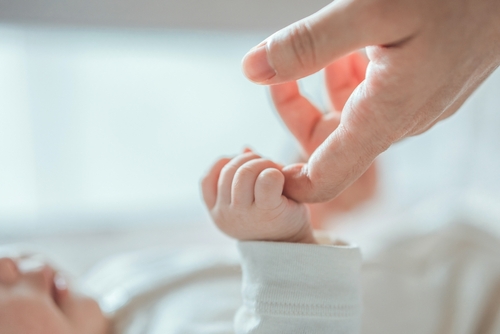There’s no crash course that can truly prepare you for what your baby’s first year will bring. You’ll hear a lot of well-meaning advice, “Sleep when the baby sleeps,” “Enjoy every moment,” “It goes by so fast” but the reality is far more layered. This first year is an emotional overhaul, a time warp of growth, exhaustion, discovery, and awe. It’s filled with high-stakes guesses, messy lessons, and surprisingly small victories that feel huge. You’ll find yourself Googling things at 3 a.m., crying from both love and frustration, and experiencing joy so deep it redefines your limits.
What makes it even more mind-blowing is how distinctly your baby changes every couple of months. One moment they’re a sleepy burrito who barely knows they have hands. Next thing you know, they’re pulling your dog’s tail, yelling “Da!” with pride. These aren’t just developmental leaps, they’re personal revolutions. Each phase of your baby’s first year unlocks new challenges, growth spurts, emotional shifts, and beautiful chaos. Below are the six stages most parents can relate to, even if they hit at slightly different times.
The Newborn Fog: Weeks 1–6

Everything is a blur in the first six weeks, and that’s no exaggeration. You’re recovering from childbirth while learning to care for a human who communicates only in cries. Your baby is mostly sleeping, eating, crying, and pooping, and not always in that order. At this stage, they can’t hold their head up or regulate body temperature well, and they rely on you for absolutely everything. Their eyes may cross as they try to focus. Their movements are jerky and uncoordinated. You might feel like you’re failing every day. But those snuggles? Those newborn sighs? They’re unlike anything else. The best advice during this stage is simple: don’t expect a routine. Rest when you can, accept help, and remember, it will get easier.
The Wake-Up Call: Weeks 6–12
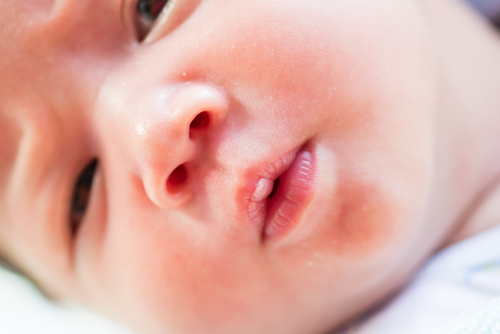
By six weeks, you might start recognizing your baby in a new light. The little blob you’ve been nurturing suddenly opens up to the world. Their eyes lock with yours. They coo and smile and kick with purpose. They respond to voices and become visibly more alert. But it’s not all dreamy gazes, this is when sleep patterns shift and so-called “witching hours” peak. Your baby might be fussy for hours every evening for no clear reason. Feeding becomes more efficient but still unpredictable. Some parents start introducing tummy time more consistently now to strengthen their neck and core muscles. You’ll also see early attempts to bat at objects, grab at your face, and maybe even a giggle. It’s a rollercoaster of good days, bad naps, and emotional wins that sneak up on you.
The Personality Push: Months 3–5
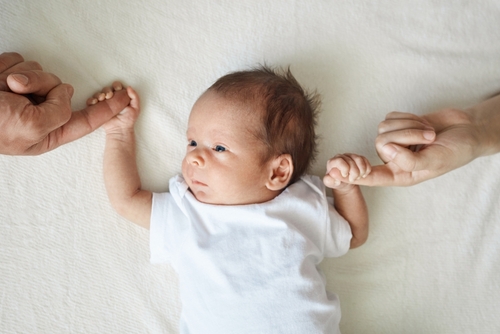
The third to fifth months are pure delight. Your baby starts showing a real personality, quirky habits, curious expressions, and clear likes and dislikes. They can now support their head, follow moving objects with their eyes, and laugh with genuine amusement. Physical growth takes off. They’ll probably double their birth weight and start rolling over. Sleep may improve (briefly) and you’ll begin to notice patterns in their naps and feedings. They grab toys, reach for your face, and shove everything into their mouth. It’s also when many babies start teething, which means drooling, gnawing, and fussiness. Emotionally, they crave connection. Your baby wants to be near you constantly, but also wants to explore. You’ll be amazed at how much they seem to learn every day.
Read More: Special Bond Since Mama’s Womb: Sweetest Video Of Twin Babies Cuddling Each Other In The Sleep
The Movement Mayhem: Months 6–8

From sitting up unsupported to crawling across the room in a flash, the movement phase begins with gusto. These months are all about action. Your baby is suddenly strong, wiggly, and obsessed with getting around. They may go from rocking on hands and knees to crawling backward, forward, or even scooting. If they haven’t started solids already, this is the time most pediatricians recommend it, cue the mess. They begin babbling in full force, saying “ba-ba,” “da-da,” and practicing their vocal cords with random screeches. You’ll likely hear more laughs, see more interactions, and deal with new parenting challenges like separation anxiety. It’s hard to sneak away, and even harder to get anything done while they’re awake. Baby-proofing is no longer optional—cords, corners, and cabinets suddenly become threats.
The Mini-Explorer Era: Months 9–11
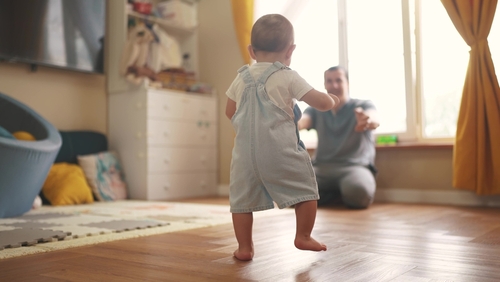
By now, your baby has turned into a fearless adventurer. They’re crawling at lightning speed, pulling up on furniture, and possibly even standing alone. Their fine motor skills develop fast, they can now pick up tiny objects between their fingers, press buttons, turn pages, and wave “bye-bye.” Their understanding of the world deepens. They’ll recognize their name, understand simple commands, and look for objects you hide under a blanket. Imitation becomes a favorite game, if you clap, they’ll clap; if you cough, they’ll fake one. Mealtimes are wild, with lots of self-feeding attempts, food flung off the tray, and suspicious side-eyes at unfamiliar textures. You may also notice a streak of defiance, like arching their back during diaper changes or shrieking when they’re told no. This stage is chaotic, hilarious, and incredibly rewarding.
The Almost-Toddler Shift: Month 12

Month 12 is a turning point. Your baby is not quite a toddler, but they’re certainly not a baby anymore either. They may be walking independently or cruising confidently along walls and couches. Their words become more intentional, “Mama,” “Dada,” “uh-oh,” and “no” might be part of their tiny vocabulary. They understand routines: they know when it’s bedtime, get excited for baths, and may protest diaper changes. They also want control. They’ll reach for spoons, insist on feeding themselves, and throw dramatic fits when things don’t go their way. Emotionally, they’re bonding more deeply with you, showing affection, but also testing limits. They thrive on praise and laughter. Their first birthday isn’t just a party, it’s a celebration of everything you’ve both survived and learned. This is where parenting shifts again: into full-on toddler territory.
Final Thoughts
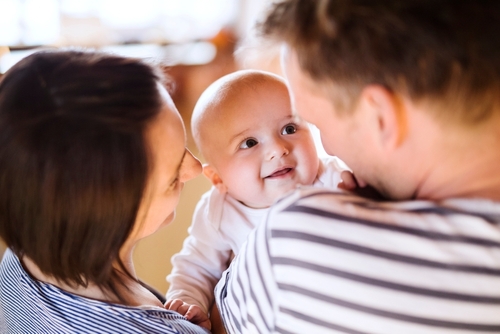
This isn’t just a timeline of milestones, it’s the story of your child becoming themselves and you becoming a parent. No book or app can fully capture what it’s like to live through that first year, because it’s different for everyone. Your days swing between chaos and wonder. Some nights, you’ll lie awake exhausted, wondering if you did enough. Others, you’ll cry over how fast it’s all going. And in between, you’ll find a thousand small joys that no one else will ever see or understand the way you do.
Every phase leaves a mark, reshaping you as much as it reshapes your baby. You’re learning just as much as they are. And while they might not remember these moments, you always will, the sleepy snuggles, the first laugh, the stubborn refusal to nap, the pride in that wobbly first step. These phases don’t last forever. But the love? That only grows. Year one is just the start. And somehow, you’re already doing great.
Read More: Invention Lets Men ‘Breastfeed’ Their Babies Because Why Not?
